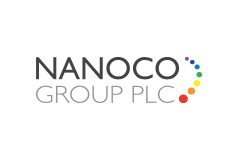Nanoco has signed a worldwide material supply and licensing agreement with Merck. Under the terms, Merck will immediately begin marketing Nanoco’s quantum dots, and will eventually establish its own production facility. Financial details have not been disclosed, although Nanoco will receive on-sale royalties.
Analyst Comment
We had the chance to follow up on this news story with Michael Edelman, CEO of Nanoco. As you can imagine, he was, with reason, very positive about this deal. Earlier this year, in April, Nanoco modified its deal with Dow from an exclusive to a non-exclusive basis. At the time, it wasn’t clear how positive this was, although, of course, Nanoco put a positive spin on the news. However after the two deals in the last week with Wah Hong (Nanoco and Wah Hong in QD Agreement), a significant supplier of optical films in Taiwan and just a week later, this deal with Merck shows that it was, indeed a positive step.
 Edelman told us that Nanoco and Merck have been in talks for a long time, but took just a few months from the Dow announcement to come to an agreement. Merck acquired Sigma-Aldrich in November last year and that company has a lot of nanotech experience to add to what Merck already has, so as Edelman said, there’s no need to teach them about the technology.
Edelman told us that Nanoco and Merck have been in talks for a long time, but took just a few months from the Dow announcement to come to an agreement. Merck acquired Sigma-Aldrich in November last year and that company has a lot of nanotech experience to add to what Merck already has, so as Edelman said, there’s no need to teach them about the technology.
While Wah Hong will buy resin, produced by Nanoco, to put into films, Merck will deliver chemical products based around the Nanoco QD IP but will make its own dots, although where that will be done has not yet been decided. Merck sees itself as a company that is excellent at manufacturing, so will see that excellence as a competitive advantage. One of the attractions of the Nanoco materials is the lack of cadmium and Edelman told us that this was essential for Merck to meet its environmental aims (and the fact that Apple and Samsung won’t buy materials with cadmium will have helped – Man. Ed.). Nanoco expects Merck to be in some form of production within 12 months.
On the question of cadmium and the ROHS, (see Quantum Dot Wars Continue in Europe for background) there will be a consultation session in Brussels on September 2nd. After that, a recommendation will be put to national governments by the European Commission. That there will shortly be four suppliers of cadmium-free material (Dow, Wah Hong, Merck and Nanoco themselves) must help the company’s argument that there is no reason to allow a continued exemption for cadmium-based materials. As Edelman put it, why should the EU encourage Chinese suppliers to use US technology when a solution that doesn’t need an exemption exists? (BR)

